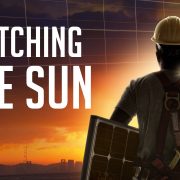Summer Movie Night: “Catching The Sun”, a Solar Power Documentary
“Before the Flood” brought all kinds of attention and opinions out of hiding regarding climate change, and spurred an interest and an appetite in the public for environmental filmography; but this Netflix film which premiered in April of 2016 focuses much more specifically on the solar power industry.
Directed and produced by Shalini Kantayya in her film making debut, the film covers a lot of ground in explaining, outlining, and debunking solar energy; it includes a brief history of solar tech in America, as well as a look into solar practices in China, and follows everyone from laborers to politicians to show their respective connections to solar and how it impacts their lives. Best of all, it examines the ideologies behind solar energy- how people assume it will impact the economy, how industries such as oil might continue without solar, how jobs can be created and structured for this upcoming energy field.
In-depth examinations into the solar power industry such as this are a wonderful resource for the general population, to not only help dispel rumors and assumptions but to give a more rounded perspective of how the technology works, how it applies to our economic market, and how it’s influencing the present and the future as well. If you have questions but prefer a more presentation-based format of answers, or just want to inform yourself on this quickly growing industry in the comfort of your home, then this documentary is just about tailor-made for your viewing.
If you liked the overview of “Before the Flood”, but are interested specifically in solar energy and how it has progressed in the United States, I would highly recommend this glimpse into the industry, offering insight and explanation of one of our most plentiful natural resources applied to power the nation.
By Danica Bergmann

